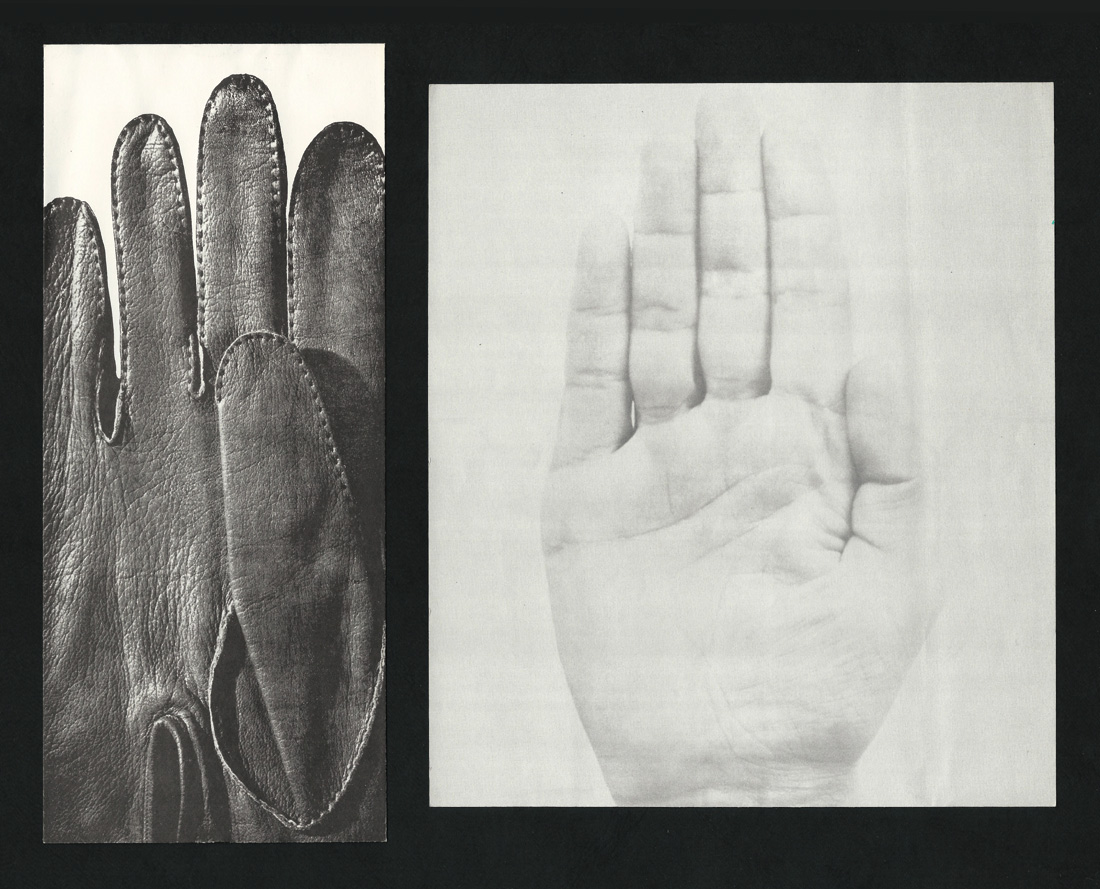MACIUNAS George
[Jurgis Maciunas] (Kaunas, Lituania 1931 - Boston 1978)
Flux Stationery: Hand in Glove [busta e carta intestata]
Luogo: (Milano)
Editore: (Flash Art Edizioni)
Stampatore: senza indicazione dello stampatore
Anno: s.d. [1972/1973]
Legatura: N. D.
Dimensioni: foglio 24x20,8 cm., busta 26,4x11,4 cm.
Pagine: N. D.
Descrizione: foglio di carta da lettera con relativa busta: la carta da lettera reca impressa l'immagine fotografica di una mano, la busta quella di un guanto. Stampa in bianco e nero. Edizione originale.
Bibliografia: Archivio della Fondazione Luigi Bonotto: Code 0121E 1/5; Jacob Proctor, Against Autonomy: Multiple Strategies in Beuys Maciunas Fluxus, catalogo della mostra, Busch-Reisinger Museum, 2007.
Prezzo: € 300ORDINA / ORDER
Il multiplo «Hand in Glove», fa parte del trittico «Flux Stationery» incluso nel Fluxpack 3, pubblicato a Milano da Flash Art e distribuito da Multhipla nel 1975. Tuttavia sembra che il multiplo sia circolato separatamente anche prima, tra il 1972 e il 1975 (fra le diverse e contrastanti testimonianze ricordiamo il catalogo della mostra «George Manciunas: More than Fluxus Graphic Design, Objects & Ephemera; New York», Ubu Gallery, 1996; pag. 13: qui il multiplo viene datato "1973".
"Maciunas designed and printed the «Flux Stationery» for inclusion in «Fluxpack 3», distributed by Multipla in Milan. The stationery was also distributed by Maciunas himself, and by Wooster Enterprises Edition, New York City. In a 1978 interview with Larry Miller, Maciunas discusses the «Flux Stationery» in terms of his conception of functionalism, which he describes as «when the piece that you are doing has an inherent connection to the form». After discussing his Venus de Milo apron, Maciunas notes that «the envelopes were like gloves and the letters were like hands. Now, again, the function is now... an envelope and a glove... same function: the glove encloses the hand... an envelope encloses the hand. Now, a non-functional envelope would be an envelope showing let's say lots of flowers... And the letterhead may be wheat or something. So the one has no connection with the other, and the fact that why flowers have to be on an envelope, they could be on a carpet, too... Now that's the difference». The stationery certainly stands among the most «functional» of Maciunas's creations, many of which (such as the one-card Flux-deck, Flux-postage, or the variously modified table-tennis rackets) are specifically designed to thwart any attempt to use them for their ostensible purpose. Like the Venus de Milo apron (the idea of which has since become a mainstay in novelty shops the world over), the stationery serves as a rare example of a commercially possible (even viable) extension of Fluxus practice" (Jacob Proctor).
Disponibile anche il solo foglio di carta da lettera senza busta: € 150
"Maciunas designed and printed the «Flux Stationery» for inclusion in «Fluxpack 3», distributed by Multipla in Milan. The stationery was also distributed by Maciunas himself, and by Wooster Enterprises Edition, New York City. In a 1978 interview with Larry Miller, Maciunas discusses the «Flux Stationery» in terms of his conception of functionalism, which he describes as «when the piece that you are doing has an inherent connection to the form». After discussing his Venus de Milo apron, Maciunas notes that «the envelopes were like gloves and the letters were like hands. Now, again, the function is now... an envelope and a glove... same function: the glove encloses the hand... an envelope encloses the hand. Now, a non-functional envelope would be an envelope showing let's say lots of flowers... And the letterhead may be wheat or something. So the one has no connection with the other, and the fact that why flowers have to be on an envelope, they could be on a carpet, too... Now that's the difference». The stationery certainly stands among the most «functional» of Maciunas's creations, many of which (such as the one-card Flux-deck, Flux-postage, or the variously modified table-tennis rackets) are specifically designed to thwart any attempt to use them for their ostensible purpose. Like the Venus de Milo apron (the idea of which has since become a mainstay in novelty shops the world over), the stationery serves as a rare example of a commercially possible (even viable) extension of Fluxus practice" (Jacob Proctor).
Disponibile anche il solo foglio di carta da lettera senza busta: € 150

